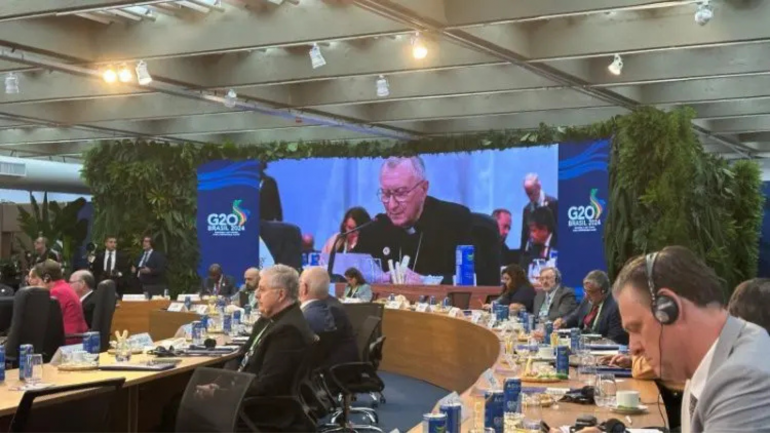Cardinal Parolin advocates global governance reforms at G20 Summit in Brazil

At the G20 Summit in Rio de Janeiro, Brazil, on November 19, Cardinal Secretary of State Pietro Parolin called for urgent reforms in global governance to address contemporary challenges and uphold human rights.
Speaking on the theme “Reform of Global Governance Institutions,” Cardinal Parolin stressed the need for structural changes to foster international cooperation and ensure peace and stability.
Highlighting the shift of power from nation-states to international organizations over the past century, the Cardinal proposed rethinking governance frameworks to effectively tackle pressing global issues such as environmental crises, public health, social inequities, and the rise of artificial intelligence.
He emphasized that these efforts must prioritize the protection of fundamental human rights and the environment.
Cardinal Parolin drew on Pope Francis’ Apostolic Exhortation Laudate Deum, cautioning against the centralization of power in the hands of a single authority or elite.
Instead, he advocated for reforms rooted in the principles of subsidiarity and equitable participation, ensuring that all nations have a voice in decision-making processes.
One of his key proposals was for wealthier nations to recognize their historical responsibility and forgive the debts of developing countries, framing this as a matter of justice rather than charity.
This gesture, he argued, would be a significant step toward global fairness and solidarity.
In closing, Cardinal Parolin highlighted the importance of creating global mechanisms that prioritize justice, cooperation, and sustainability, calling on world leaders to act decisively for the common good.
The Cardinal’s address, in alignment with Vatican priorities, underscored the Holy See’s commitment to fostering a global order that serves humanity and the planet responsibly.- Inputs from Vatican News
Radio Veritas Asia (RVA), a media platform of the Catholic Church, aims to share Christ. RVA started in 1969 as a continental Catholic radio station to serve Asian countries in their respective local language, thus earning the tag “the Voice of Asian Christianity.” Responding to the emerging context, RVA embraced media platforms to connect with the global Asian audience via its 21 language websites and various social media platforms.












